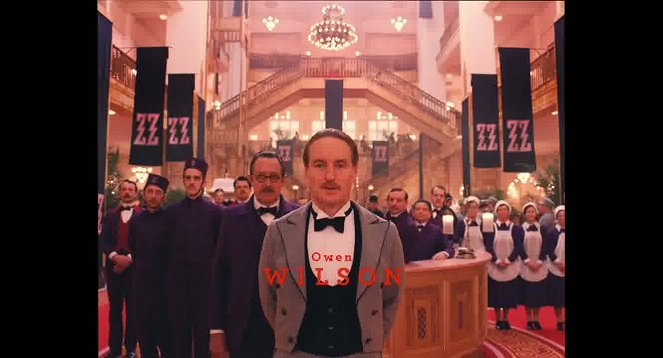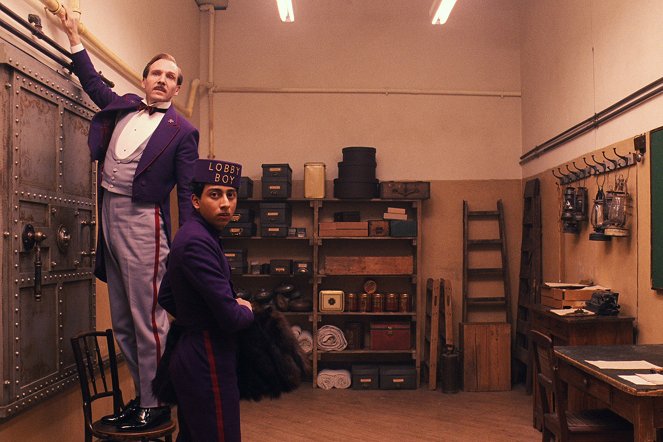Regie:
Wes AndersonDrehbuch:
Wes AndersonKamera:
Robert D. YeomanMusik:
Alexandre DesplatBesetzung:
Ralph Fiennes, F. Murray Abraham, Mathieu Amalric, Adrien Brody, Willem Dafoe, Jeff Goldblum, Harvey Keitel, Jude Law, Bill Murray, Edward Norton (mehr)Streaming (5)
Inhalte(1)
GRAND BUDAPEST HOTEL erzählt die Abenteuer von Gustave H. (Ralph Fiennes), dem legendären Hotelconcierge eines berühmten europäischen Hotels in der Zeit zwischen den Weltkriegen – und seinem Protegé, dem Hotelpagen Zero Moustafa (Tony Revolori). Die beiden werden enge Freunde, nachdem sie in den Diebstahl und die Rettung eines wertvollen Renaissance-Gemäldes sowie in die Schlacht um ein riesiges Familienvermögen verwickelt werden. Es geht aber auch um eine verzweifelte Verfolgungsjagd auf Motorrädern, Zügen, Schlitten und Skiern sowie eine überaus rührende und nicht weniger große Liebe. All das passiert auf einem Kontinent, der sich plötzlich und dramatisch verändert… (Fox Deutschland)
(mehr)Videos (15)
Kritiken (19)
Wes und seine animierten Balken, diesmal in einer Kabarettversion von der Welt von Gestern. Den Film beschreibt eines der Zitate, welches der Hauptfigur gewidmet ist, am besten: "Seine Welt war bereits lange zuvor untergegangen, als er sie betrat." Im Gegensatz zu Zero zweifle ich aber ernsthaft daran, dass Anderson dieses Paradoxon mit Grazie angeht. Leider bin ich in der Lage, die Pointen und Kamerabewegungen sowie jene des Sternencameos abzuschätzen. Die Geschichte ist noch weniger erfinderisch als im Fälle des Murder in a Parlor Car Compartment des tschechischen Komik-Theaters des fiktiven Autors Jára Cimrman und es ist schwer zu sagen, ob ein Alibi mit Sechsgroschenromanenniveau hier Stand hält (denn hier gibt es ja dutzendweiser Wendungen, die bei Grand Budapest Hotel in Anbetracht dessen linearen Karikaturstils fehlen). Sobald die Begeisterung durch das künstlerisch schön erfasste Retro-Ambiente nachließ (sofern wir denn einen Stil als Retro benennen können, der frei interpretiert an etwas Altes erinnert, jedoch hiermit nicht damit korrespondiert), befand ich mich in einer Abfolge dynamischer und lose verbundener Gags, die in einem ungefähren intellektuellen Gulasch aus Verweisen, Paraphrasen und Zwinkern bestehen. Anderson ist derart fasziniert von dem Glitzerzeug seines Spielwarenladens, so dass zum Zeitpunkt, als er sich bis zum melancholischen Finale durchkämpft, einem die viele Zeit bedauert, die man den Figuren und Landschaften gewidmet hat, die zwar wunderschön, jedoch vollkommen flach sind. Grand Budapest Hotel zeigt einen Künstler auf dem Höhepunkt des Narzissmus, dem aber das tatsächlich Interessante unter dem Zustrom bunter Requisiten oder blödelnder Gags entgeht. sicherlich macht dies mehr Spaß als das verzweifelt überbewertete Moonrise Kingdom, bestimmt, aber ansonsten ist´s ähnlich bedeutungslos.
()
Die besondere und unabgedroschene Poetik von Wes Anderson bringt auch weiterhin Lachen, Ergriffenheit und ein schönes Erlebnis für die Zuschauer. Ralph Fiennes in der Titelrolle brilliert förmlich, die anderen Hofdarsteller erhalten mehr oder weniger Raum. Die Filme von Wes Anderson sind nicht für jeden, aber ich bin überzeugt davon, dass er sich schon lange eine zahlenstarke Gruppe von Fans geschaffen hat.
()
Ein spielerisches Bild zum Ausmalen. Es ist originell, wie es bei Anderson üblich ist. Die Geschichte wird mit Schwung erzählt, die Figuren sind interessant und die Schauspieler ausgezeichnet. Ich bin froh, dass auch in den US-Kinos der Film kommerziell erfolgreich war, sein einzigartiger Autor hat es verdient.
()
A lot of figures, no characters. A lot of narrators, no narrative. A lot of movement, no direction. Anderson again balances on the edge of a chasm of gratuitous horsing around in grand style. The design of the individual settings and periods (red and purple art deco in the 1920s, grey and pink during the Nazi era, orange and yellow in the 1960s), the geometric perfection in the mise-en-scene and the seemingly hand-crafted tricks make up an unbelievably entertaining blend of the poetics of classic slapstick and Méliès’s more spectacular films. (A detail for connoisseurs is the fact that each era was shot in a different aspect ratio: 1.85:1 for the present, 2.35:1 for the 1960s, academic format for the 1930s). However, I don’t agree that Anderson has matured and has given us a sad and melancholic film in colourful wrapping. Any attempts at seriousness fail, whether in relation to the characters or to the theme of war and times long past. The war context, the hint of nostalgia and the multiple rewritings of Central European history serve mainly as an excuse for colourful fooling around. Zweig is present more or less thanks only to the nesting-doll structure of the narrative, the infrequent consideration of which over the course of the film raises a question that I had to ask myself repeatedly, despite my desire to let myself be freely carried away by Anderson’s imagination – “What is this for?” According to the principle of “why do something the easy way when you can do it the hard way”, the film contains a full range of prototypical situations that we would find in their unaffected form, which would better serve the story, in classic escape and caper movies. The acknowledged inspiration taken from Hitchcock’s thrillers (a persecuted innocent) and Lubitsch’s screwball comedies from obscure European countries (particularly Ralph Fiennes’s character and his attitude toward women, but not the “cleverness” of the dialogue, whose humour rather often consists in a wager on a sure thing in the form of well-timed vulgarity) is purely superficial. The intentional contrivance of the situations finds a response only in the actions of the characters, who respect strict rules and walk in diagonal lines, thus elegantly closing the circle, as the contrived world gives meaning to its lifelessness through artificial figures. I admire the precision with which Anderson builds his worlds and I enjoy the flawless comic timing of all of the actors, but I simply cannot find any deeper meaning, greater depth or narrative imaginativeness in Grandhotel Budapest. 75%
()
The cardboard world of Anderson's childish fantasy hooked up with a script someone dug up in Alfred Hitchcock’s forgotten archives, and I’ve definitively succumbed to this fool whose films I both liked and loathed at the same time. While it doesn't really have human emotions, but rather forcefully screwed-on tremors based on the situation the characters are in at the time, this thriller ride is as tense as anything else. The elevator scene at the end and the subsequent shootout in the gallery are both scenes that few people can really film today. PS: Most directorial aces would sell their souls for this casting.
()



Werbung